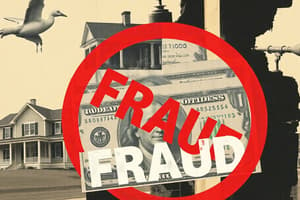Podcast
Questions and Answers
Which of the following debts are likely to be excluded from a credit report?
Which of the following debts are likely to be excluded from a credit report?
What is a common reason borrowers commit occupancy fraud?
What is a common reason borrowers commit occupancy fraud?
What could happen if a borrower is caught committing occupancy fraud?
What could happen if a borrower is caught committing occupancy fraud?
Why is occupancy fraud often committed by small investors?
Why is occupancy fraud often committed by small investors?
Signup and view all the answers
Which factor contributes to the higher cost of financing for investment properties compared to owner-occupied properties?
Which factor contributes to the higher cost of financing for investment properties compared to owner-occupied properties?
Signup and view all the answers
What is asset fraud primarily concerned with?
What is asset fraud primarily concerned with?
Signup and view all the answers
Which of the following actions is NOT associated with asset fraud?
Which of the following actions is NOT associated with asset fraud?
Signup and view all the answers
What type of fraud describes a self-employed borrower pretending to be an employee?
What type of fraud describes a self-employed borrower pretending to be an employee?
Signup and view all the answers
How may a borrower conceal their self-employment while applying for a loan?
How may a borrower conceal their self-employment while applying for a loan?
Signup and view all the answers
Which statement correctly defines liability fraud?
Which statement correctly defines liability fraud?
Signup and view all the answers
What commonly accompanies employment fraud?
What commonly accompanies employment fraud?
Signup and view all the answers
An applicant who owns 25% or more of their employer must be classified as what?
An applicant who owns 25% or more of their employer must be classified as what?
Signup and view all the answers
What might a borrower do to misrepresent their financial capacity on a loan application?
What might a borrower do to misrepresent their financial capacity on a loan application?
Signup and view all the answers
Study Notes
Asset Fraud
- Involves misrepresenting asset information on loan applications to qualify for mortgages.
- Borrowers may list assets they don't own.
- Inflated asset values are often reported to appear wealthier.
- "Renting" assets from others is a common tactic.
- Borrowers might take undisclosed loans or borrow property to add to their loan application, promising to return it after the mortgage closes.
Employment Fraud
- Occurs when borrowers lie about their employment status or employer.
- Self-employed borrowers often pose as employees to qualify for loans, due to difficulty verifying income with tax returns.
- Borrowers owning 25% or more of a business are considered self-employed, even if it's a corporation.
- Verification of employment usually involves verifying tax returns.
- Borrowers often try to hide self-employment through false reporting.
- Friends or family may falsely verify employment and income to help in qualification.
- Fake employers may be created to verify employment for borrowers.
Income Fraud
- Often associated with employment fraud.
- May involve falsified tax returns, document alteration, concealed debts, and overstated income from assets.
Liability Fraud
- Borrowers often hide existing debts.
- It's tough to hide short-term debt (installments, credit cards) as credit reports are accurate.
- Commercial loans may not always appear on credit bureaus, but self-employed borrowers can have personal liability.
- Other debt, like alimony or child support, might not show up.
- Borrowers may delay taking on new debt (like cash advances) until after the loan application is processed.
Occupancy Fraud
- Occurs when the borrower misrepresents the use of a property on a loan application.
- Borrowers often claim owner-occupancy for better loan terms, even if the property will not be occupied.
- Lower interest rates and reduced down payments are common incentives.
- Investment properties have a higher financing cost due to perceived risk.
- Some loan programs are not for investment properties.
- Occupancies can be reversed, listing investment as owner-occupied, generating income, and not paying that income.
- Common in investors who flip houses, or use platforms like Airbnb.
- Consequences of occupancy fraud can include demands for the loan repayment in full, fines, penalties, and even jail time.
Studying That Suits You
Use AI to generate personalized quizzes and flashcards to suit your learning preferences.
Description
This quiz explores the various tactics used in asset and employment fraud related to mortgage applications. It highlights the methods borrowers might employ to misrepresent their financial status, including false asset listings and employment verification. Understand the implications of these practices in the lending industry.




